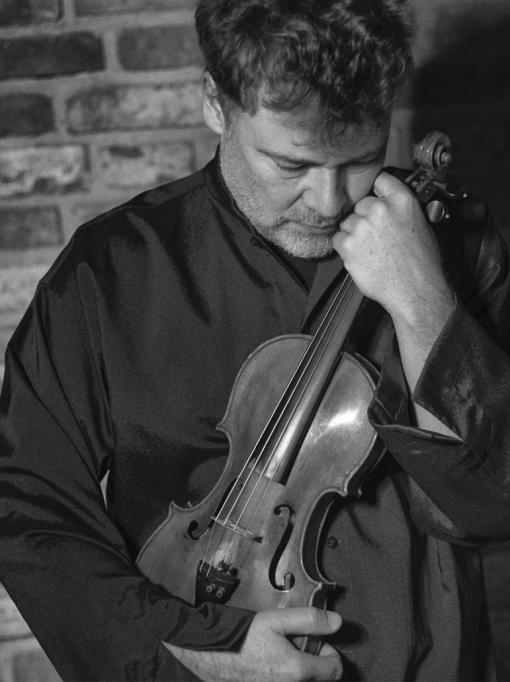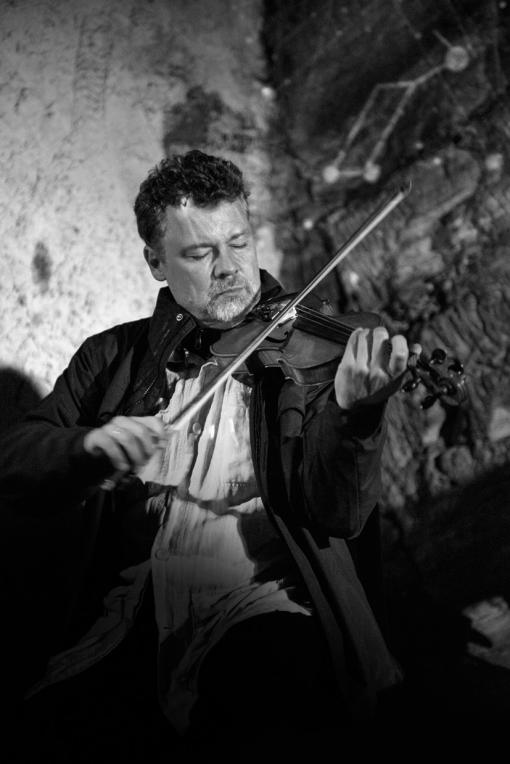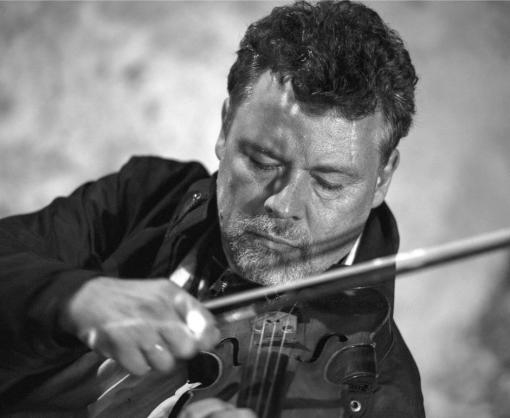We met violinist Pavel Fischer at the Budějovická metro station in Prague, and on the way to the Dobeška Theater we managed to discuss his holiday in Italy. At the time, we were already working out the subtitle of this year's Concentus Moraviae festival “From Roots to the Future”. Next to Dobeška, where the Sklep Theater plays, is what we call the “woodshed”, where the Škampa Quartet has been rehearsing for thirty-five years. Pavel Fischer was a founding member of the ensemble which he left at a time when it was enjoying one international success after another. As he says, he was attracted by greater musical freedom and a quieter life. At Dobeška, after our interview, he had a concert with cellist Olin Nejezchleba and guitarist Norbi Kovács. We started with him, although our main topic was Fischer's residency at this year's Concentus Moraviae.
Your concert will start in a few hours, what have you prepared with Olin Nejezchleba and Norbi Kovács?
Partly my repertoire, partly what Olin and Norbi have brought. We all play in different groups and we also include things that we play separately in our concerts together. But we also have a joint repertoire that we don't play anywhere else. Olin has lots of folk stuff from Moravia, where he's from, and he used to play in the dulcimer there, while Norbi plays a lot of Hungarian folk music, but he likes to wrap it in swing. I spend a lot of time in Manchester and the north of England, where I brought some reels, jigs, and their music in general. This music sounds different when you play it with an instrumentation of fiddle, guitar, and cello. We're not trying to play authentically, but we’re more looking for a crossroads approached by three different people.
That's what visitors to Concentus Moraviae should expect from you this year. How long does your history go back with the festival in which you’ve already played with the Škampa Quartet?
In my Jánošík days I played the Concentus with my former band Kamael, later it was Bardolino, with whom I still play today. My latest project is a collaboration with the accordionist Jakub Jedlinský, with whom we will play at the festival for the first time this year. I have known his director David Dittrich for many years, so I’ve got the Concentus under my skin.
Your JeFis Duo with Jakub Jedlinský seems to me a bit like a lighter version of Bardolino, in which you both play.
Bardolino leaves very little room for improvisation. But Jakub and I make sure that about fifty percent of the music is created on stage. It's completely free improvisation, and that plays a big role for us.
In the festival program, though, you present concerts made up of Balkan music.
We’ve already done a similar program with the South Bohemian Philharmonic and the conductor Jan Talich. It includes the klezmer, Bulgarian râčenice, Ukrainian music, and my own composition which I thought up in a similar vein.
Searching for roots in the museum and in the pub
How do you find your way to different folklores? In Manchester, where you teach a lot, there's your personal experience behind it, but what about Bulgaria or Poland?
There are different paths. My mother-in-law works in a museum in Pyšely, and people bring her various treasures there, including handwritten records of folk songs. I know a man in Manchester who’s from Ukraine, and he’s written down about twenty local dances from the Carpathian Mountains. There's also a lively tradition in England of pubs where bands write on the blackboard as they come into the pub. They then play in that order too, and occasionally I'll hear something I like. Of course, I also draw from Bartoš or Sušil, but I don't try to give the impression that we play authentic miner songs. Rather, I put together a composite that I like from different sources.
Apart from JeFis Dua, you’ll also lead your resident ensemble at the festival. What kind of people are in it?
I've played with all of them recently. At different festivals, you often meet different bandmates and with some of them you think, well, that was ok, but I don’t need to do that again. And then someone comes along who you feel amazing with and want to play with again. It’s from these people that I put together the ensemble for Concentus Moraviae. It includes the Austrian cellist Erich Oskar Hütter, with whom we had a sextet in Salzburg. The Belgian violist Diede Verpoest was a student of mine and today plays in the excellent St. George Quintet. The extraordinary pianist Katya Apekisheva is arriving from London, and there’s also the Czech violinist Markéta Janoušková, with whom we have also played many times. Her father also played in a dulcimer band, so she inherited a close relationship with folk music from him. Today, the fantastic violist Martin Stupka also plays in the Škampa Quartet. These are all people I know well personally and as musicians.
You will play two programs with a slightly rotating resident ensemble. One will feature Martinů and Dvořák, the other features your Morava Quartet and twice Bartók. How long is the journey from the romantic spirit of Dvořák to Bartók the folklorist?
It’s an exquisite stylization in both cases. Dvořák's quintet with two violas contains echoes of Native American rhythms as well as a melody he originally composed as an American anthem. In Bartók's quintet, the Hungarian roots are clearly evident. But these are not quotations. Bartók's quintet is remarkable because the composer rejected it. He composed it at the beginning of the 20th century, when he was still under the influence of Richard Strauss and his music was in the spirit of late Romanticism. The quintet's later success in 1921 angered Bartók, as he had already developed his own distinctive and highly dissonant style. The score was thought to have been destroyed, but in 1963 it was rediscovered by Bartók's pupil Denijs Dille. The Quintet may not represent Bartók in a super-avant-garde form, but it is a masterpiece.
Will you be playing Bohuslav Martinů's Three Madrigals for Violin and Viola with Martin Stupka?
Yes, I wanted him to be able to shine as well, because the Belgian violist will play the extremely exposed first viola in Dvořák's Quintet. Madrigals are very close to my heart, I fell in love with them in the early days of studying with Milan Škampa. I still have a vinyl record of him playing them with the primary player of the Smetana Quartet, Jiri Novak. It’s typical Martinů, especially from the second movement as his style and Moravian melodicism shines through.

Imperfections are strictly forbidden
Milan Škampa was one of your teachers of precisely and consistently played classics. But how about your concerts like the one you’re about to perform with Olin Nejezchleba and Norbi Kovács? Is everything prepared beforehand, do you improvise, or what kind of balance to you seek between these two components?
We have a lot of improvisation in the program, although we know the forms and order of the pieces in advance, so the architecture of the evening is already given. But it represents the structural columns, between which about fifty percent of the music is made up on the spot. At any given moment I'm playing classical and “non-classical” music about half and half, and I enjoy being able to take a bit of freedom and spontaneity into classical music that doesn't rely on every dot. On the other hand, I retain the pedantry from classical music in terms of technique and the willingness to go into detail when necessary.
Can you describe this transfer of spontaneity from folk music in a bit more detail? After all, nowadays even dulcimer players aren’t self-taught, it didn’t exist in classical music, and not everything is written down...
I judge it primarily from the point of view of my own development. At first I was led exclusively to classical music, and in my family there were more or less no deviations allowed. I did play guitar with my friends, but my parents didn’t know about it. At the conservatory, Professor Grumlíková continued my strictly classical education with an emphasis on perfectionism, and this was later reinforced by Professor Škampa and other members of the Smetana Quartet, with whom I studied. Same thing with Piero Farulli and Walter Levin. They were all obsessed with perfection in the sense of playing the score as faithfully as possible.
But that in itself is hardly a mistake.
It is a good thing in principle, but when overdone it can take away the joy of the playing itself. This enormous discipline and bonding with the Škampa Quartet sometimes led us to feel that there was always a recording microphone hanging over us or someone watching us with the score in hand, taking notes. We were always judging ourselves whether we were good enough to succeed. But folk music is much more based on a desire to make people happy. Classical music has to have that in it too, but it’s out of reach for such a long time because you're under this constant pressure, which leads to obsession and terrible self-control...
...or even bigger psychological problems.
A person should use their own common sense in classical music sometimes. When I was a student, the argument that I liked something was absolutely out of the question. What was important was what the tradition was and what one had to do. The important thing was to play everything right.
I would say that tradition often took precedence over notation. Sheet music didn't mean the work of the composer, but rather papers that were lying around in the archives of some institution, with a lot of later notes and stereotypes added to them.
When I practiced pieces by living composers, I was able to see that most composers don't even think this way. When we played a quartet for Peter Eben and there were some inconsistencies in the score, we would ask him how he intended it. He would look at the sheet music and tell us that he didn't remember and to play whatever we wanted in that spot. I got the feeling that he imagined more freedom than we allowed ourselves.

A properly understood entity riddled with irrelevant details
I think there’s a growing disparity between how music is thought or written about and how music is performed. Critics sometimes hail the laudatory phrase that “the musicians have fulfilled the composer's intention”. What are you actually fulfilling when you play, say, Bartók?
One must, of course, consider the circumstances in which the music was composed. Bartók may not be the best example, because he tended to write everything down as carefully as possible. But even in his music there are things that cannot be written down. The same applies to Janáček, who collected a lot of folk songs but couldn't get every irregularity that appeared in them into the notation. This is also reflected in his compositions, which contain Moravian phrasing: if it’s not playing, then it’s in the way. There are endless conversations about Janáček's First Quartet because the editions by Milan Škampa and Miloš Štědroň contain different notes. Searching through Janáček's sources is very difficult, because he often didn’t date his manuscripts and was changing things all the time. I believe that it doesn't matter whether there’s a C or a C# in a certain spot, as long as one expresses the overall character of the piece.
Janáček scholars won't like you for that.
At the beginning of the “Letters Confidential” quartet, Janáček describes the moment when he first saw his love, Kamila Stösslová. At such a moment, the quartet cannot decide to play without vibrato. There must be passion in it, and if there isn't, you take away the music's essence. When you hear the rhythm of the verbuňk in Bartók, which is often, you can't decide to play it up-down. It would give the second note the wrong accent. But when you find different notes here and there in two sources for one piece, it hardly seems to matter. I pick what I like from the composer's intent.
Is that the approach you pass on to your students?
Sometimes one of them will come to me and say, “Professor, I really like this, but I don't think it's allowed.” I’ll tell them that “I like it” is a pretty good argument, especially when I know that the person really thinks about music. On the other hand, there are some very famous soloists today who go to other extremes and play everything backwards at all costs. When the notes indicate piano, they play forte. Everybody else more or less sticks to the script, but they turn it inside out just to be different. Traditions may be a set of bad habits, as they sometimes say, but some have become established for good reasons.
Tradition is to be developed, not preserved.
When one expresses the spirit of the times and the music, then one should really support the author's intent in that sense. But one should certainly not meticulously insist on what has supposedly always been done.
No point in overdoing it
After almost twenty years with the Škampa Quartet, you must have plenty of experience with the meticulousness of classical musicians.
In the days of the Škampa Quartet, we naturally tried to play as well as we could. That in itself is a terrible drudgery, but the psychological pressures are worse. On top of that, there's the travelling; sometimes you sit on a plane and can't remember where you're going. I wondered at the time if I wanted to live the rest of my life that way, and the answer “no” became increasingly clear. There was a transition period, of course, when I became interested in other genres. It soon became apparent, though, that this couldn't be combined with playing in a quartet, because a quartet is a full-time job.
Isn't contemporary classical music oversaturated by the sheer number of excellent performances?
This is due to the enormous awareness. Once upon a time there were violinists Jascha Heifetz and David Oistrakh who were almost the world's top violinists, while the others were below them. In the days of the Smetana Quartet, there were ten top ensembles who travelled the world; today there are hundreds. If a soloist wants to make a name for himself, this cannot be achieved without absolute technical perfection. But he must also be exceptional, in personality or otherwise.
Doesn't that lead to unmanageable permanent stress?
It often takes the joy out of the music itself. I know a lot of people in the industry who at first glance appear to be totally confident and composed, but at the same time they’re dependent on psychopharmaceuticals or psychoanalysis, breaking down and in total agony before they go on stage. Maybe it makes some sense to them and to the audience, but I doubt it.
Interview commissioned by the Concentus Moraviae festival

































No comment added yet..